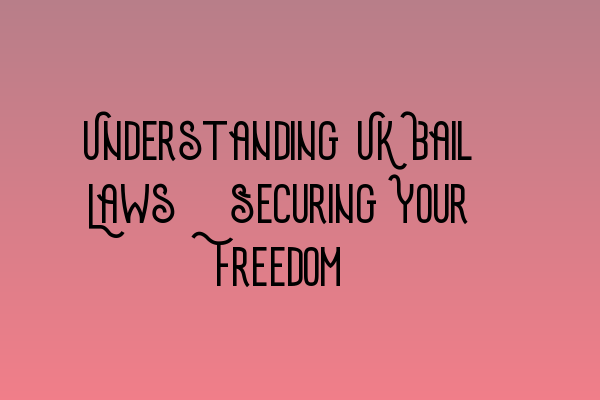Understanding UK Bail Laws: Securing Your Freedom
When it comes to criminal law in the UK, understanding the intricacies of the bail system is crucial in securing your freedom. Being aware of your rights and how the process works can significantly impact the outcome of your case. In this blog post, we will delve into the details of UK bail laws to help you navigate through the legal process with confidence.
What is Bail?
Bail is a legal arrangement that allows a person charged with a crime to be released from custody while awaiting trial. It ensures that individuals are not unnecessarily detained, presuming they present no risk to society or are unlikely to abscond.
There are various types of bail available in the UK, including:
- Police Bail: This is the initial stage where the police release a suspect without charge but with certain conditions.
- Court Bail: This is when the court grants release to a defendant pre-trial, subject to conditions that must be adhered to.
- Conditional Bail: When strict conditions are placed on the release, such as attending regular police check-ins or refraining from contacting certain individuals.
- Unconditional Bail: The defendant is released without any conditions attached.
It’s important to note that the decision to grant bail ultimately lies with the court, which considers several factors when making that determination.
Factors Considered in Granting Bail
When deciding whether to grant bail, the court takes into account the following factors:
- Flight Risk: The likelihood that the defendant will abscond or fail to appear at their trial.
- Risk to Society: The potential danger the defendant poses to others if released.
- Character and Community Ties: The defendant’s reputation, past criminal record, and ties to the community.
- Previous Court Attendance: Whether the defendant has previously complied with court instructions or defaulted on bail conditions.
- Offense Severity: The seriousness of the crime and the potential penalties associated with it.
It’s essential to present a strong and compelling case when applying for bail to increase the chances of securing your freedom.
Securing Bail: The Process
The process of securing bail begins with the initial police arrest. Upon arrest, the police assess the circumstances and decide whether to grant police bail or detain the individual until they can bring them before the court. In cases where police bail is granted, the individual will be released from custody on specified conditions.
If the case progresses to court, the defendant’s legal representative may make an application for bail on behalf of their client during the first court appearance. The court will consider the factors mentioned earlier before making a decision on whether to grant bail or remand the defendant in custody until the trial.
It’s essential to consult with a criminal law solicitor experienced in bail applications to navigate through this process effectively. They can assess your case, gather necessary evidence, and present persuasive arguments to increase the chances of securing bail.
Conclusion
Understanding UK bail laws is crucial in protecting your rights and securing your freedom while awaiting trial. By familiarizing yourself with the different types of bail, the factors considered in granting bail, and the overall process, you can better navigate through the legal system.
If you have been charged with a crime and need professional legal assistance, our team of criminal law solicitors at SQE Criminal Law & Practice Law UK is here to help. Contact us today for expert guidance and support.
Related Articles:
